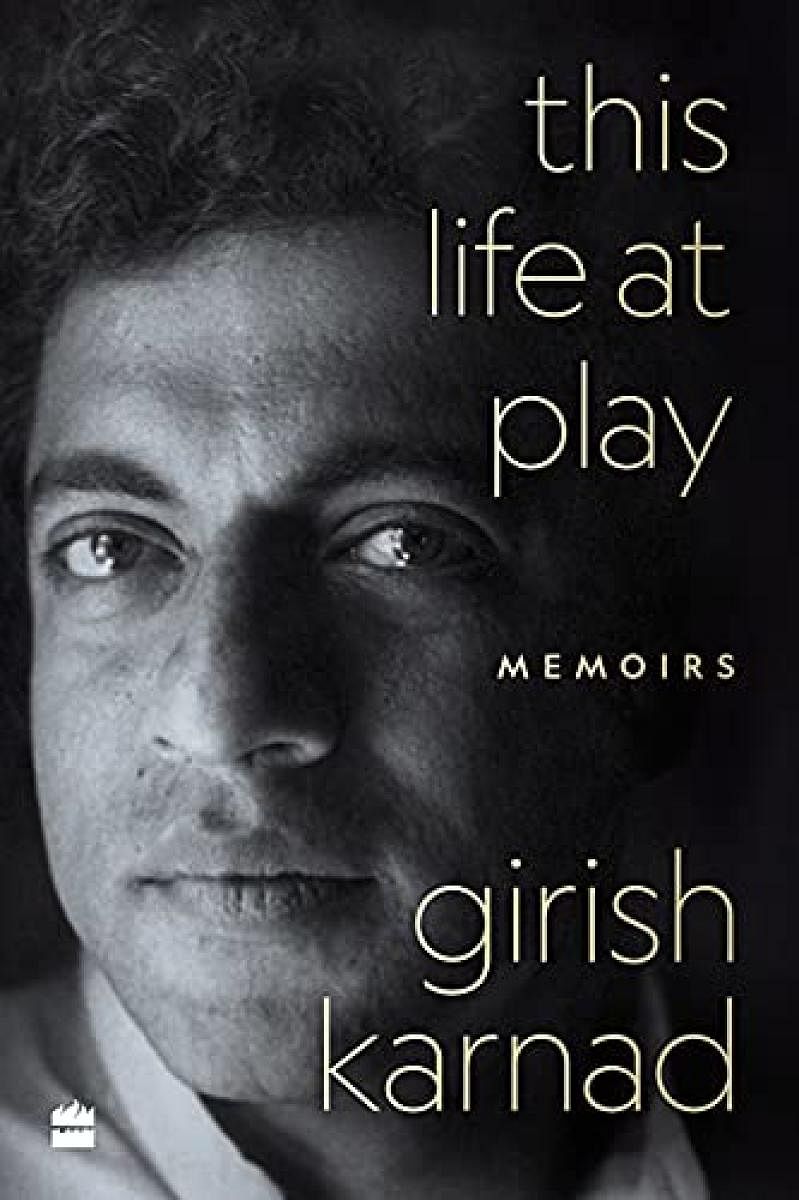
Who was Girish Karnad? Playwright? Actor? Filmmaker? Cultural ambassador? He was all that and more. Exactly 10 years after the publication of his Kannada autobiography, Aadaadata Aayushya, comes its English translation, ‘This Life at Play: Memoirs.’ Translated in parts by Karnad and Srinath Perur, it is 310 pages long and an absorbing read till the last page.
The book covers the first half of his life, tracing his childhood in Sirsi, Dharwad and Bombay, his youth as a Rhodes scholar in Oxford, his career in publishing, his tryst with theatre in Kannada, Marathi and Hindi, his successes and travails in films, and his personal and writerly life. “It covers half my life… I don’t know if there will be a book about the second half of my life, but if there is, perhaps, I could call it Nodnodta Dinamaana!” The titles are borrowed from a Bendre poem: ‘Aadaadata Aayushya/Nodnodta Dinamaana.’
Karnad could not continue after two chapters of the second part. “It’s just one award ceremony after another, and nobody should have to read about that,” he said, explaining why he abandoned it. Two short episodes from the material, however, have been added in this book. An additional note by his children, Raghu and Radha, sheds light on some aspects of his character. Karnad begins with an account of his gutsy mother, Krishnabai Mankikar, and ends with his marriage to Saraswathy, 14 years after they ‘met and expressed an interest in each other’. He dedicates his memoirs to Madhumalati Gune, the doctor who was to abort him when he was in his mother’s womb. He writes, “Had the doctor arrived at the clinic as promised, these memoirs and their narrator would not have existed.”
Influence of theatre
The work succinctly describes Western influences on Marathi and Kannada theatre and paints unflattering pictures of many of his contemporaries. It also takes a look at his many friendships. Karnad recounts moments with A K Ramanujan, Kirtinath Kurtakoti, G B Joshi, B V Karanth and Mrinal Sen, to name just a few.
The book highlights the efforts of a rebellious generation and the theatrical traditions that nurtured its creative talent. Karnad, who yearned for cosmopolitanism, was shocked when A K Ramanujan was let down by Karnatak University, Dharwad, for a position of Reader. This propels him to review his decision to stay in India. He leaves India on a Rhodes Scholarship to study BA in Oxford, and around the time, he also discovers his talent in writing for theatre.
“It had been my ambition since childhood to become a poet. With the arrival of this wretched play (Yayati), I began to realise that I was not a poet, but a playwright. I was greatly disappointed,” he writes. He writes candidly about his love life, too. It begins during his stay in Oxford. He confesses, “After an entire year of struggling with myself, I finally blurted out to a girl. I kissed her and told her, ‘You are the first girl I’ve ever kissed.’”
After his return from England, Karnad gets a job at the Oxford University Press in Madras. He records his lonely life there: “I did not allow myself any opportunity to have a physical relationship. This period was one of the darkest in my life… so, I was alarmed by the self-destructive state I had been driven [to] by sexual frustration.”
He writes with surprising frankness about his lovers in Oxford. Back on Indian soil, he finds India struggling economically, “but the gates were opening on to a wonderfully vibrant era of cinema, theatre, literature and arts.”
He reveals that his affair with a married woman in Madras inspired the play Hayavadana.
On his strained relationship with B V Karanth, colossus of Kannada theatre, he writes, “More issues cropped up between us … related to Karanth’s drinking and so on, but the Girish Kasavaralli episode remained a thorn in my side until the end.” Karnad was upset to learn that Karanth cooked up a story about Kasavaralli regarding the latter’s ostensible delay in submitting an assignment at FTII, Pune.
Karnad says film actors Vishnuvardhan and Chandrashekhar did not acknowledge that he introduced them to the screen and playwright Vijay Tendulkar never admitted he was inspired by Hayavadana when he wrote his Ghashiram Kotwal.
What did Karnad treasure the most in his life? “It is not often that one is given credit for saving an ancient art form from extinction. If I have any real claim to fame, it is this one —Kutiyattam.” The reference is to an operatic form practised in Kerala.
Karnad acted in films across languages, but he says he hadn’t the slightest interest in acting. “What I really wanted with a passion was to be a director like Satyajit Ray,” he says.
Erudite and reflective, amusing and insightful, Karnad creates an extraordinarily vivid account of the unpredictable paths that his life took. The narrative is dense with people, events, places and insights. At times, nonlinear, the playwright uses dialogues and other literary devices to tell his life story. But the interest never slackens. In his translation, Perur has, by and large, remained faithful to Karnad’s tone.
The adventurousness of Karnad’s life makes his memoirs a pleasure to read, especially so because it chronicles, for the first time, many unusual aspects of Karnataka’s cultural space.
Ultimately, ‘Life at Play’ offers an honest picture of Karnad, but it does not completely construct his character. There are no references to some of the major controversies he was involved in. The second part, had he completed it, might have had these details.